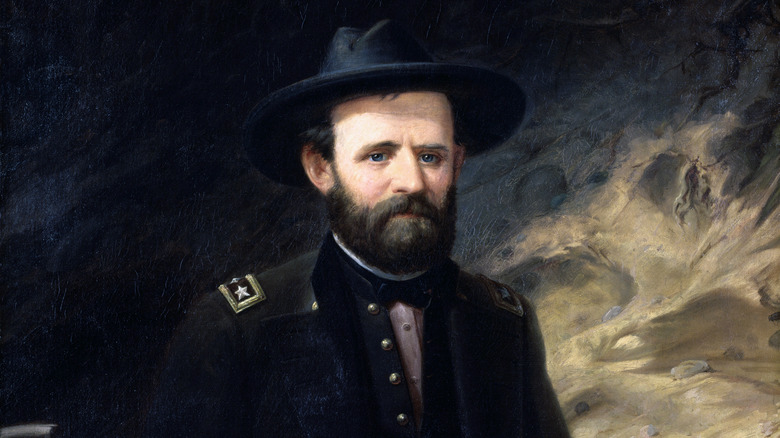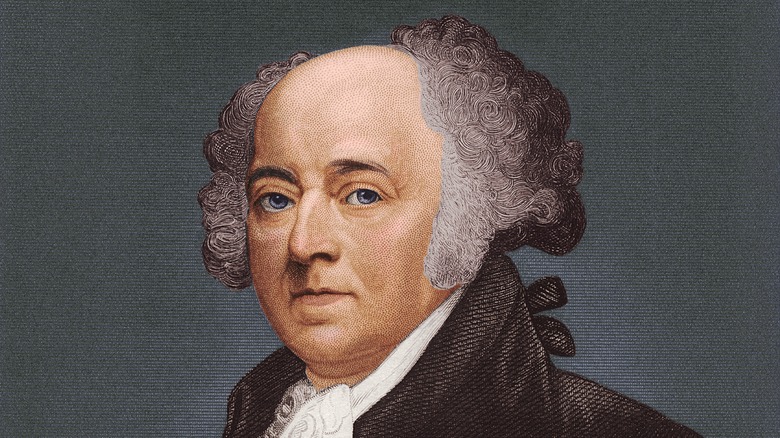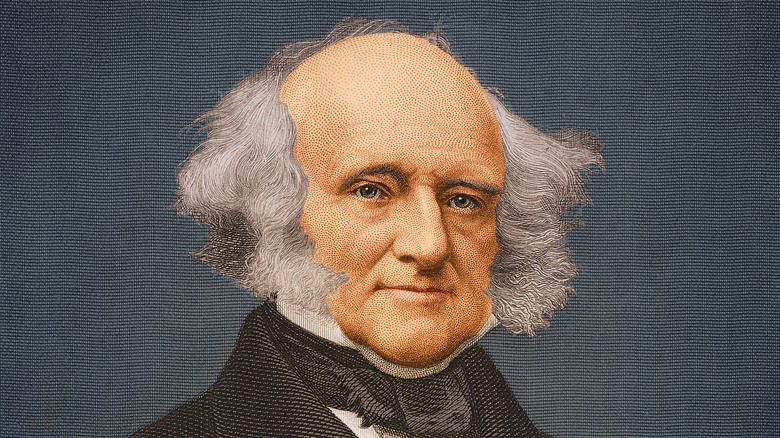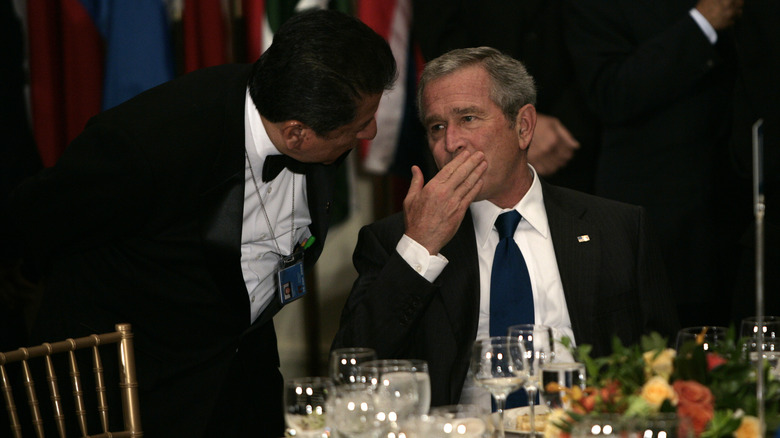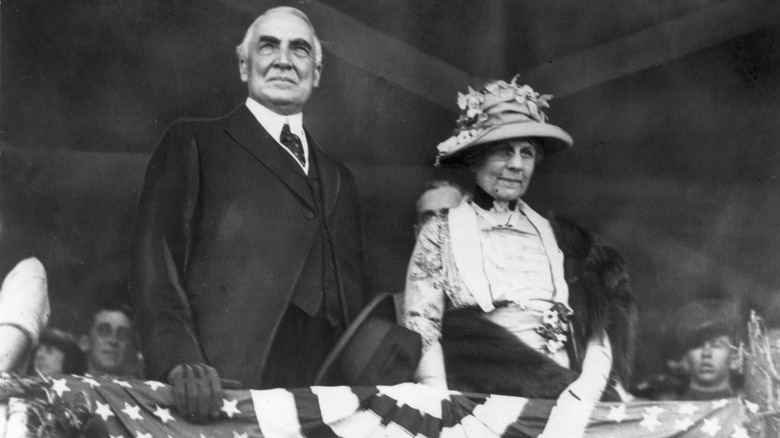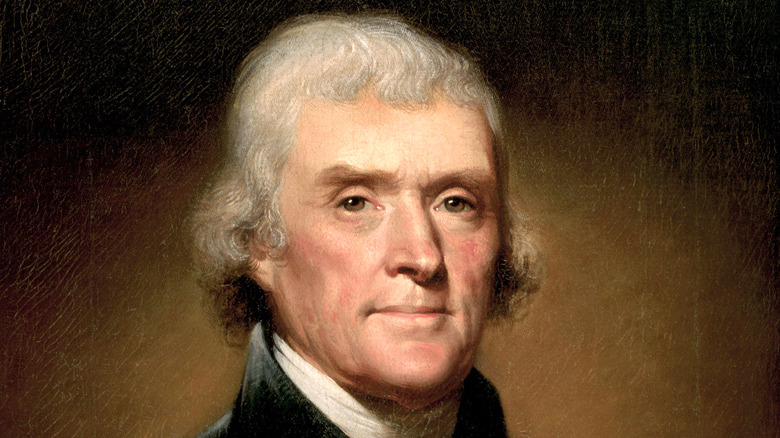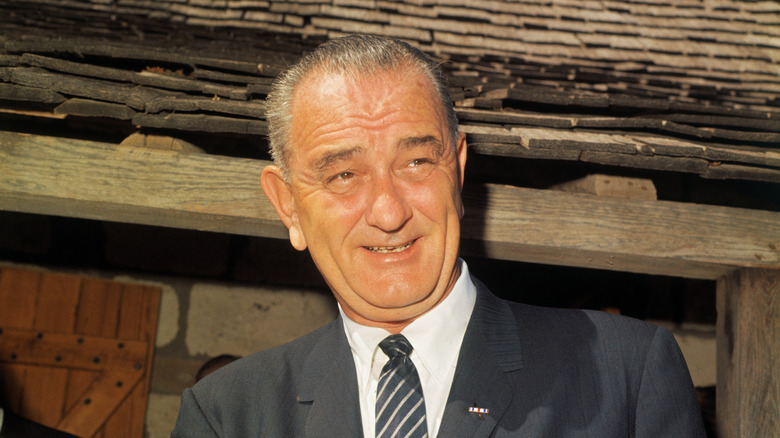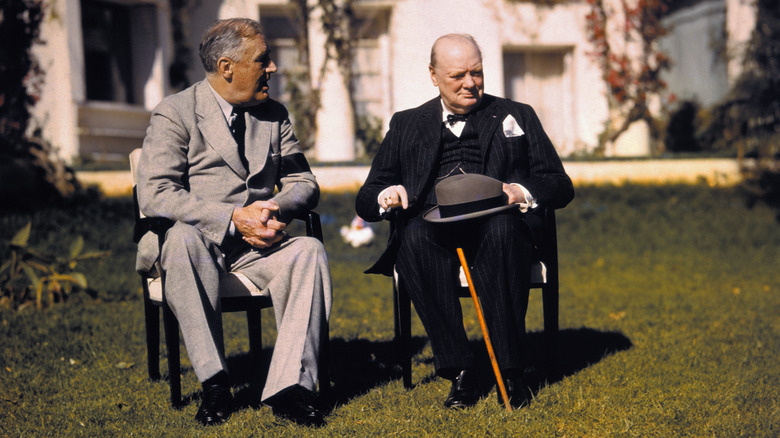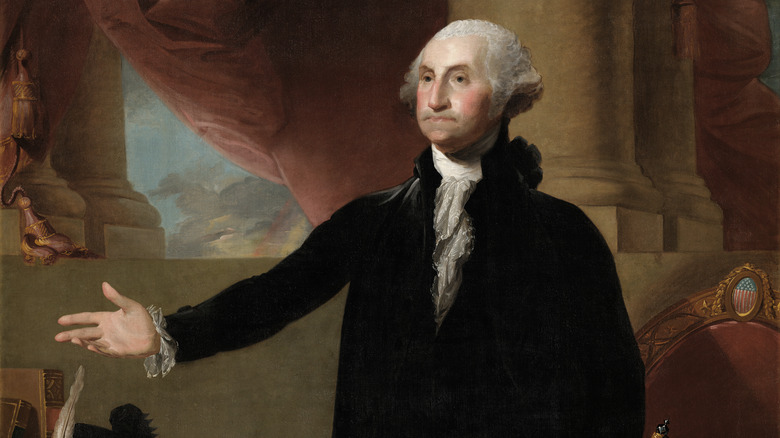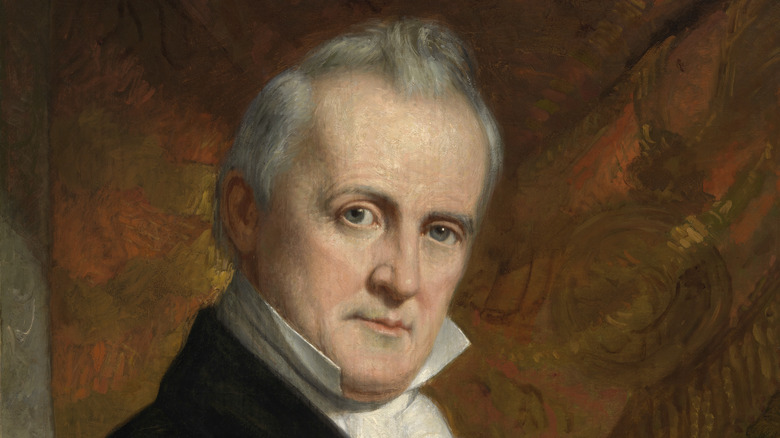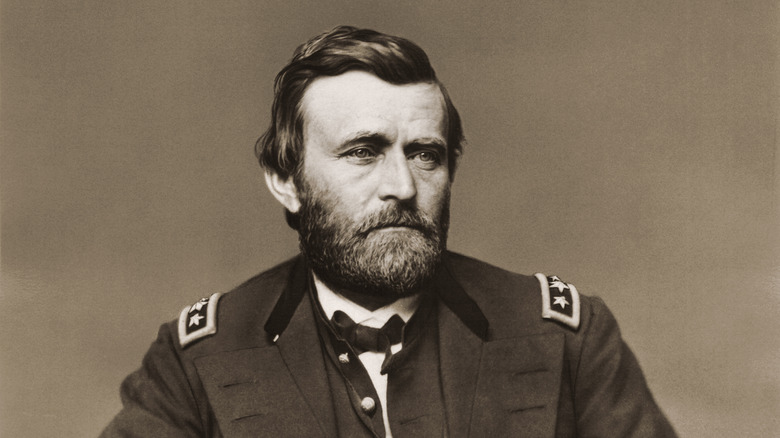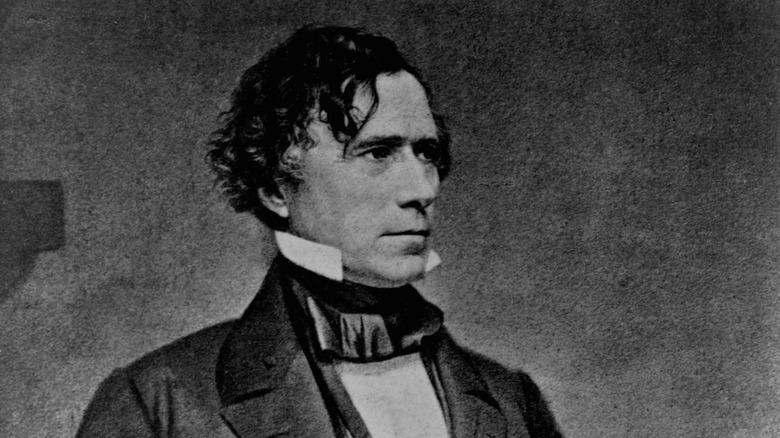The Heaviest Drinking Presidents In American History
Perhaps due to the stresses of the job, the highest office in the land has attracted a surprisingly large number of heavy drinkers over the years. Many of the worst culprits came from the 18th and 19th centuries when people were more likely to imbibe incredible amounts of booze in place of water.
Today, on the other hand, it is often said that an American president needs to pass "the beer test" to win an election — essentially, they've got to be the kind of person you'd like to get a brew with. Many of these presidents fit that bill, known as fratboy party animals and consummate cocktail drinkers, they were anything but boring when away from the office. Presidents like Thomas Jefferson and Franklin D. Roosevelt liked a few drinks and were downright fun when off the clock.
At the other end of the spectrum are the presidents whose addiction to alcohol makes for sobering reading (no pun intended). Ruining their lives and their livers, men like Ulysses S. Grant and Franklin Pierce, had their political reputations severely tarnished thanks to their alcohol misuse.
John Adams
America's second president, John Adams achieved many things before and during his presidency — surprisingly, he may have done many of them while ever so slightly drunk. Adams had a fondness for drinking, but he was especially fond of hard cider, which he once described as "refreshing and salubrious." He picked up the habit of drinking it at Harvard, and enjoyed it so much that he drank it every day for breakfast for most of his life.
A daily splash of booze was so essential for Adams in fact, when he was getting ready to sail for France on the U.S. frigate Boston, Adams wrote a packing list for himself that included: a keg of rum, a barrel of Madeira, and four dozen bottles of port. During the course of the first Continental Congress, he was also thoroughly inebriated. He told his wife: "We go to Congress at nine and there we stay, most earnestly engaged until three in the afternoon, then we adjourn and go to dinner with some of the nobles of Pennsylvania at four o'clock and feast on ten thousand delicacies, and sit drinking Madeira, claret, and burgundy 'til six or seven."
Martin Van Buren
Martin Van Buren developed a reputation for really holding his liquor. Van Buren, whose presidency was marked by a number of disasters such as the financial panic of 1837 and the Trail of Tears, probably badly needed a drink most of the time, and he was affectionately nicknamed "Blue Whiskey Van" as a result of his fondness for liquor. According to John R Bumgarner's "The Health of the Presidents," Van Buren was famous for never seeming drunk, even though he drank a great deal.
On the other hand, Van Buren seems to have been self-reflective about the dangers of alcoholism, and he once warned his son in a letter that "What you may regard as an innocent and harmless indulgence will take you years to overcome in the public estimate." Prone to overindulgence himself, Van Buren drank so much wine, port, and Madeira he already had a bad case of gout in his 50s.
George W. Bush
President George W. Bush quit drinking for good after years of alcohol misuse and bad behavior. Although it is debatable whether or not Bush had an alcohol addiction, he definitely drank too much, and his love of getting smashed won him the disapproval of his friends and family. Bush's drinking habits went back to at least his college days at Yale, where he was celebrated for his drunken frat boy activities, rather than his academic record. After he left college, however, his antics became less amusing. Some of Bush's friends have testified that the former president was a binge drinker, who was unable to stop once he started.
By the age of 30, Bush hit a real low point when he was pulled over for drink-driving; his DUI got him fined and his license temporarily suspended, but it also became major political news when it was uncovered by the press during his campaign for president in 2000. It wasn't the only time his drunken antics became public knowledge either: In 1986, Bush was involved in another infamous incident, when he walked up to a Wall Street Journal reporter in public and, while blind drunk, threatened "You [expletive] son of a b***h ...I saw what you wrote. We're not going to forget this."
Unlike some drunken presidents, however, Bush decided he had to change. At the age of 40, having become increasingly religious, Bush quit drinking for good after waking up one morning with the mother of all hangovers.
Warren G. Harding
Warren G. Harding's turbulent presidency is primarily remembered for sleaze, scandals, and illegal liquor. In addition to having extramarital affairs, and running a crony government, Harding was a hated hypocrite who enjoyed late-night poker parties accompanied by lashings of booze. Despite supporting prohibition when he was in the Senate, during his stint in the White House, Harding continued to drink freely.
While in public, Harding complained that Americans were not following the law, but instead supporting bootleggers and relaxing at speakeasies, in private, the president was just as bad. He was not always discreet about either — he once arrived blind drunk on whiskey to a meeting with a Union leader at the Oval Office.
Increasingly worried about being found out, Harding hid his own liquor cabinet in his bedroom for a time to cover his tracks. However, word got around that he was still drinking, which seriously damaged the president's reputation. Although he supposedly attempted to give up drinking for real in 1923, it was too little too late. He could not shake his sleazy image, and to make matters worse, a story broke that members of his corrupt poker circle — "the Ohio gang" — were actually in cahoots with bootleggers as well.
Thomas Jefferson
Thomas Jefferson's drinking habits ran toward the more tasteful end of the spectrum — he was obsessed with wine and wine-collecting and wrote endless pages of notes on the subject. Throughout his life, Jefferson bought hundreds of bottles, and on the occasions he ran out, he expressed considerable distress about it. In 1815, for example, he wrote to one wine merchant, "Disappointments in procuring supplies have at length left me without a drop of wine. I must therefore request you to send me a quarter cask of the best you have ... wine from long habit has become an indispensable for my health, which is now suffering by it's disuse" (via the National Archives).
Despite imbibing a considerable amount of alcohol, he frequently commended himself for his good sense of drinking wine instead of heavier spirits — drinks he blamed for all manner of social ills. He strongly believed that the fashion for drinking light French-style wines should be encouraged to prevent Americans from drinking heavier fortified wines like Madeira. To that end, he spent most of his life attempting to grow various vines at his Monticello estate, dreaming that it would one day catch on.
At the time, wine was not especially in favor of the U.S., so he imported whatever he could. His favorite wine of all was white hermitage, a concoction he declared to be the very best in the world. While he was acting president, he ordered an astonishing 550 bottles of it in one go to keep himself well supplied.
Lyndon B. Johnson
Rowdy southerner Lyndon B. Johnson had some exceptionally dangerous drinking habits that caused a public scandal when they came to light in the 1960s. In 1964, Time magazine broke the story that Johnson had gone out driving, racing down the road at great speed with a cup of beer within "sipping distance" in the car. Johnson was transporting a group of reporters in the car at the time, and he threw his hat over the speedometer in a weak attempt to disguise his reckless driving.
This shocking episode of drink-driving was no isolated moment of poor judgment. Joseph Califano recalled in his memoir "Triumph and Tragedy of Lyndon Johnson," that he had also seen the president sipping a drink while on the road. Armed with a plastic cup filled with scotch and soda, Califano claims that when the pair went out for a drive, Johnson regularly slowed down to get a refill, stating: "[He would] hold his left arm outside the car, shaking the cup and ice. A Secret Service agent would run up to the car, take the cup, and go back to the station wagon. There another agent would refill it with ice, scotch, and soda as the first agent trotted behind the wagon. Then the first agent would run the refilled cup up to LBJ's outstretched arm and waiting hand, as the president's car moved slowly along."
Califano notes that, in general, the president also liked to finish the day with a glass of scotch. However, he finally slowed down and stopped completely when anxiety about Vietnam War started to get to him. He dropped the scotch, feeling he should remain fully in control of his faculties.
FDR
It may come as little surprise that the man who ended prohibition really liked to drink. While Franklin D. Roosevelt did not regularly drink excessively, making a good cocktail was part of his daily routine, and he liked to experiment with new mixtures — sometimes with questionable results.
Roosevelt referred to his evening wind-downs as "the children's hour," — a reference to the poem by Henry Wadsworth Longfellow. It was a chance for the president to play with the cocktail shaker among friends, and he was known to have forced his bizarre martinis on all in attendance. On one trip, this included Joseph Stalin, who remained unimpressed with the American concoction. Fond of changing the quantity of spirits he used in a completely artless fashion, Roosevelt's grandson Curtis Roosevelt once remarked that the president made the worst cocktails in the world. On the other hand, it is well known that he popularized the dirty martini — the tangy version of the drink that's made with brine — and he can be credited with the invention of the "Haitian Libation," a mixture of dark rum, orange juice, egg white, and brown sugar.
It is disputed how heavy Roosevelt's drinking actually was on the regular, but he typically liked to have two or three cocktails in the evening after dinner. His most notorious drinking bouts took place in the company of his friend and ally from across the pond, Winston Churchill. The pair allegedly worked late into the night accompanied by Churchill's signature brandy and cigars — events it took Roosevelt many days to recover from.
George Washington
America's first president set the standard for heavy drinking for every president after him. At the climax of the constitutional convention of 1787, George Washington threw a party along with 55 others, and ran up a bar tab for 45 gallons of alcohol, paying the equivalent of $15,400 as of 2018, according to The Washington Post. The bill included 54 bottles of Madeira, 60 bottles of claret, 22 bottles of porter, 12 bottles of beer, eight ciders, and seven punch bowls — enough for everybody there to have several bottles of fortified wine each, plus extra. An additional bill indicates that the group also paid for the staff at the City Tavern to get drunk as well.
Outside of special occasions, Washington was still a pretty big drinker. Washington Irving writes in his "George Washington: A Biography" that the president's daily routine consisted of a beer or cider followed by several glasses of Madeira after dinner. Beer was a particular favorite of his, so much so that he began brewing his own. But he also opened a whiskey distillery at his place in Mount Vernon, for making both ryes and brandies. One of the beer recipes he left behind has since been recreated by the Coney Island Brewing Company, but sadly had a limited run.
James Buchanan
In the 19th century, President James "old buck" Buchanan was known for putting away eye-watering amounts of liquor and wine. He regularly replenished his supply of whiskey by buying ten gallons of the stuff at a time, and newspapers from the era frequently refer to Buchanan's seemingly superhuman ability to drink without getting drunk.
Famous newspaper mogul and friend of Buchanan, John Forney, once commented that, "The Madeira and sherry that he has consumed would fill more than one old cellar..." On the other hand, he also complimented the president on his taste in booze, saying, "the rye whiskey that he has 'punished' would make Jacob Baer's heart glad... [his strong wine] would make an old British sea captain weep joyful tears." He went on to remark that Buchanan typically drank multiple bottles in a single session, but congratulated him for remaining remarkably sober throughout.
While Buchanan's demeanor may have remained unchanged by his drinking — his health was affected by his over-consumption of liquor. Later in life, like many other hardcore drinkers, Buchanan was saddled with a crippling case of gout.
Ulysses S. Grant
Ulysses S. Grant was an extremely heavy drinker who appears to have crossed the line into alcohol addiction for at least part of his life. In 1854, he was forced to resign from the army for his excessive boozing, and many people believe he was drunk throughout the entirety of the Civil War.
Grant most likely developed his habit during his stint as a young man in the California infantry, a place that historian W. H. Bran writes in his "The Man Who Saved the Union" had an extreme drinking culture, even by the low standards of the day. A lieutenant who met Grant there once remarked that "There was not a day passed but what these officers were drunk at least once, and mostly until the wee hours of the morning ..." Grant's fellow soldiers from this era went on record that Grant was often reduced to a childlike state after just a few glasses, and clearly could not handle his drink.
Today historians are divided on just how drunk Grant was later in life, and whether he really was drinking before important battles. Whenever Grant struggled during the Civil War, the press tended to blame his alcohol, which seems to have been a recurring issue: At the battle of Shiloh, for example, and during the Vicksburg campaign, rumors about Grant's drinking were placed center stage. Others, including Grant's wife, dismissed the stories as malicious. Either way, by the time he accepted the sober office of the presidency, he appeared to have become more or less booze-free.
Franklin Pierce
Often remembered as one of America's least successful presidents, Franklin Pierce's life was as depressing as his term in office was. Franklin, who upon losing his party's nomination famously declared, "There's nothing left but to get drunk," was not just a hard partier, or even an indulgent tippler, but rather had severe alcoholism, an addiction that destroyed his life and well-being.
Pierce's very religious wife helped him to contain his drinking for a short while, however, in general, he would continually hit the bottle when life got tough. Although he had a brief flirtation with the Temperance Movement in the 1840s, Pierce never really got over his addiction, and he was crushed by the pressures of his life and office. The death of his only living son around the time he was elected as president, pushed him to start drinking heavily again, and his group of very drunk friends made it difficult for him to quit.
When Pierce retired, his drinking also got increasingly severe. John R Bumgarner reports in his "Health of the Presidents" that alcoholism seems to have run in Pierce's family, and that the president suffered numerous complications from his drinking throughout his life, including neuralgia and chronic gastritis. In the end, the bottle ultimately killed him; he died of cirrhosis of the liver in 1869.
